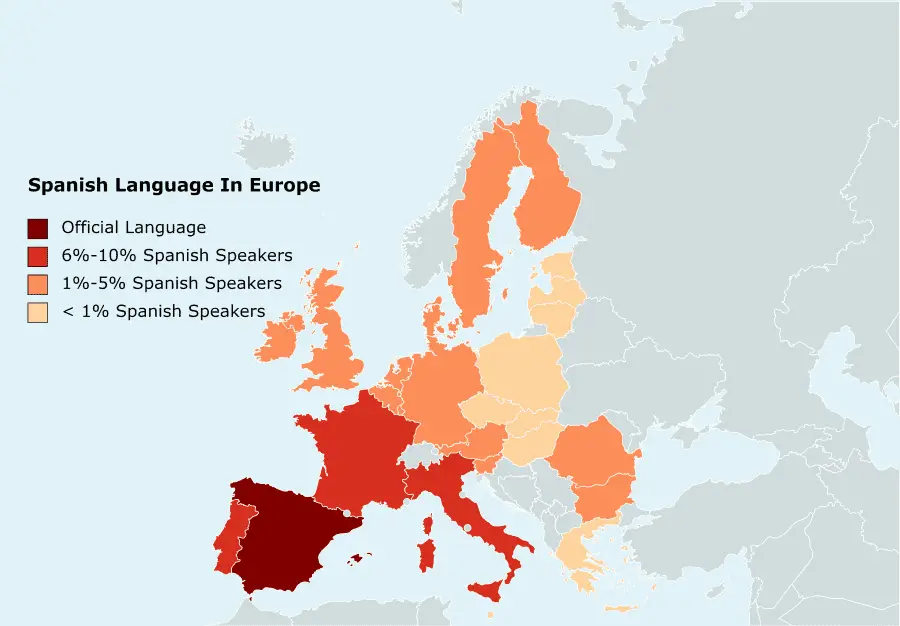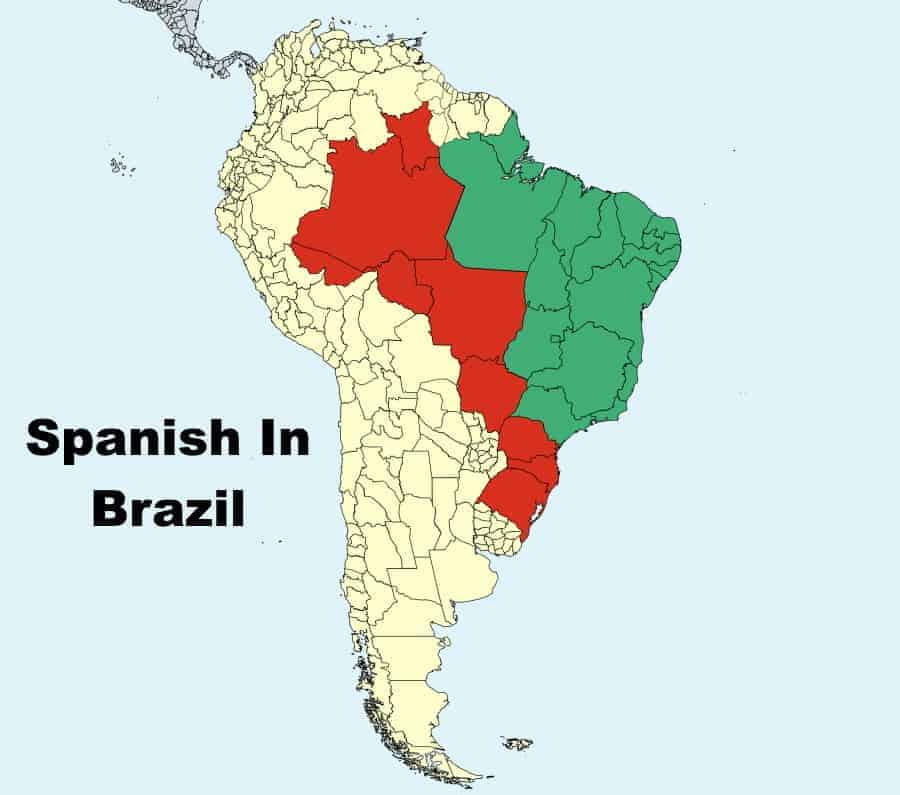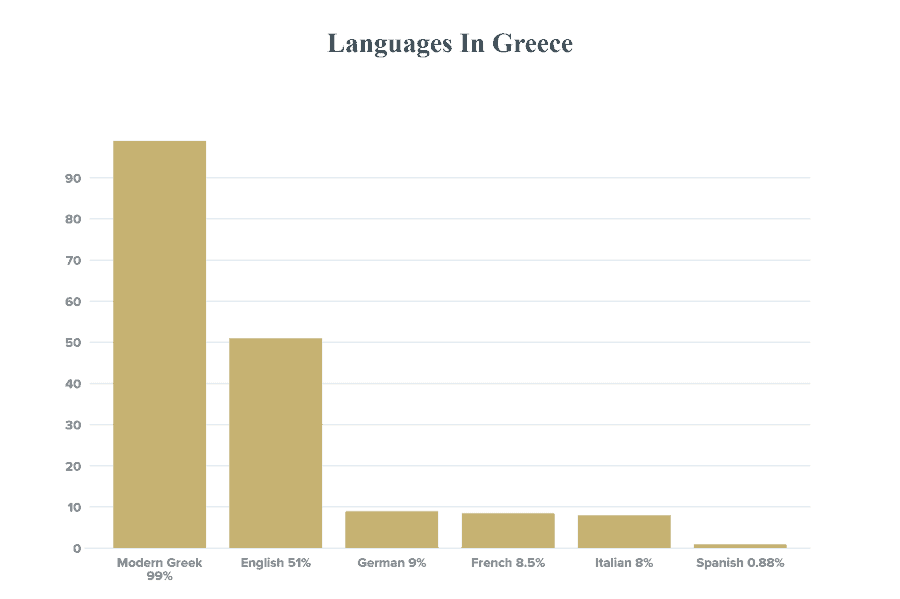Greece is an ancient country with many famous beaches and historical sites that attracts tourists from all over the world. Since it has so much tourism, different languages are introduced to Greeks all the time that otherwise are uncommon for them. So, Spanish being one of the most popular languages, how widely spoken is Spanish in Greece?
Spanish is not commonly spoken in Greece with 0.88% of the Greek populous speaking it. In Greece, only 3% of Greeks think that Spanish is a important language to learn for any reason. As such, the vast majority of Greeks don’t speak Spanish and most don’t intend to learn it.
Yet, how many actually speak Spanish in Greece? Does Greek sound like Spanish? What are the most common languages in Greece? Learn the answers to those questions and more by reading further!

Contents
How Widely Spoken Is Spanish In Greece?
Spanish is considered a very popular language and is certainly well known, yet how many people speak it across the world? Generally, Spanish is mainly spoken in a country if it is the official language, or if it is close to another country that does speak predominantly Spanish.
So, how would this affect Spanish in Greece? Is Spanish widely spoken there?
Spanish is not widely spoken in Greece as a first or second language. There are no countries that surround Greece that provide economical incentives for Greeks to practice Spanish. Since there isn’t pressure of any sort to learn the language, Spanish does not have a large place in Greece.
Yet, the reasons go even further than that, with how Greeks see languages as a whole which then affects the prevalence of Spanish in Greece. We look at this in the next section.
What Do Greeks Think About Learning Languages?
Though in Europe there are many countries that have all sorts of different languages used by the public, Greece isn’t one of them. Greeks pretty much only speak Modern Greek (mind blowing, I know), with 99% of the populous of Greece speaking the official language.
The most predominate language in Greece besides Modern Greek would be English, not Spanish. Without a doubt, English is the most popular second language in Greece and I go over the reason why at length in my article How Common Is Spoken English In Greece?.
Since Greece has had, as a nation, economical troubles in the recent past it will still affect how Greeks see different issues in the world. So, if learning a language helps them financially Greeks tend to be more apt to learn it.
This is can be proven through some interesting statistics below (from the study Europeans and their Languages). This will inform our look at the reasons why Spanish is just not that popular in Greece.
| Reasons Greeks Give To Learn A Language | Percentage Of Greek Populous |
| To help ones job prospects in home country | 69% |
| To help get jobs in foreign countries | 73% |
| To help one study abroad | 54% |
Nearly all of the reasons Greeks give to learn a language have to due with improving ones status in life. The idea that Greeks look at the financial benefits for learning a languages is further proved by the main reason they give to not learn a language.
| Reasons Greeks Give To NOT Learn A Language | Percentage Of Greek Populous |
| Due to costs of learning the language | 45% |
With Spain being on the other side of Europe and no other Spanish speaking countries in the region or on their main trade routes, it becomes clearer why Greece has such a low level of Spanish speakers.
Do Greeks Learn A Lot Of Languages?
If Greeks generally learn languages from the stand point of how it effects their prospects of future success, do Greeks learn Languages for reasons other than financial?
The data below (which comes from the research study Europeans and their Languages) shows that Greeks don’t have much zeal in learning languages for most any reason. Why might that be the case?
| Language Learning Statistics Regarding Greeks | Percentage Of Greek Populous |
| Greeks that speak two languages | 15% |
| Greeks that have started a language recently | 2% |
| Greeks that wish to learn a language next year | 5% |
| Greeks who have continued a language | 9% |
| Greeks who haven’t learned or don’t intend to start a language | 51% |
Greeks don’t have a great love for language learning in general (this includes the Spanish language), which combined with the aforementioned statistics regarding why Greeks give to learn a language, it gives us a large piece of the puzzle.
Since there is not really a country near that speaks Spanish that provides jobs for Greeks, they don’t have a practical basis to learn it.

Spanish is uncommon in Greece because Greeks do not want Spanish and there are no Spanish speaking nations nearby that can influence them in to doing so. Spain for instance, being pretty much the only country in Europe that speaks Spanish as a official language, is literally on the other side of the continent.
One country that shares similarities between Greece regarding levels of Spanish would be Brazil. As I discussed in my article How Common Is Spoken Spanish In Brazil?, Spanish is not widely spoken in Brazil. Yet, how could this help us to understand Spanish in Greece?
Though both Greece and Brazil have extremely low amounts of Spanish speakers, Brazil has the difference of having many countries on their border with Spanish as the predominate language. As such, there are more Spanish speakers in Brazil around the edges of their country.
Greece, with no countries on their border or even nearby that has Spanish as the official language has even less of a Spanish speaking population than Brazil. It goes to show that even countries that generally do not wish to use Spanish, like Brazil, will have more precisely because of those around them.

Spanish levels change if there are countries nearby that speak it. The closer you are, the more likely that the particular language will make inroads your own country.
This isn’t exclusive to those in Greece either. Though it is not the only reason, it is one of the main reasons anyone learns a language.
Some of the other motivations for language learning could include:
- education
- travel
- family heritage
- enjoyment
In Greece, on a national level these are more secondary. They don’t find most motivations for learning a language good enough. Compared to a lot of other countries in Europe, they are not as proficient in language learning.
Why Is Spanish Not Popular In Greece As Opposed To English?
There is no denying the fact that Spanish is not common in Greece, though how can we get a specific idea of the popularity? Two important statistics from the study European and their Languages below answer this very question.
- 92% of Greeks say that English is a important language to learn for future success in life, especially in the case of children and their future.
- Only 3% of Greeks say that Spanish is useful whatsoever regarding success in one’s own life.
The most common second language in Greece is English.
It’s helpful to compare English and Spanish in Greece, so we can come to a better understanding of why one is popular and the other is not.
In Greece, the biggest difference between the two languages is that Greeks consider English to help them with their career and education. Which if the main considerations for learning languages for Greeks are true, then this is no surprise.
One interesting similarity with Spanish and English to point out, is that there are no countries around Greece that have English as a official language or use English more than Greeks do. Even then, English is still popular in Greece due it being the language of science and mathematics, or higher education.
How might Greeks opinions of the two languages effect how many of them speak it? (Stats are also from the study above)
- 51% of Greeks can speak English to some degree.
- Less than one percent of Greeks speak Spanish, or to be exact, 0.88 of one percent speaks Spanish in Greece.
We can see the earlier point about Greeks not liking language learning showing itself in action. More Greeks have high opinion of the two languages by far than people who can actually speak them.
How Many Greeks Speak Spanish In Greece?
We now know that Spanish in Greece amounts to a very small percentage of the population. Though it really does get more apparent that Spanish is in the minority in Greece when you take into an account the exact number of people who actually speak it.
Greece is a small country population wise. So, how many in Greece can speak Spanish?
There are close to 10.72 million people living in Greece, and 0.88 of one percent of those can speak Spanish. That equals only 94,000 Spanish speakers in Greece. This means less than one in every 100 people in Greece that you meet on the street will have some level of Spanish.
These statistics are part of a study done by the EU (European Union) on language learning and usage across Europe. Though Spanish is shown not to have a high representation in the country, neither does nearly any other language.
Though we must keep in mind that these are all estimations, we can’t know the exact number of people, but rather just the general idea. This applies to just about anything when dealing with such big numbers.
Not only does Greece have a small population of Spanish speakers, this is compounded by the fact that the overall population is rather small itself. The total number of Spanish speakers are even smaller when compared to other countries.
Do They Teach Spanish In Greek Schools?
Spanish is not taught in schools, at least not on a national level in Greece. Other than a specific private school, it isn’t a mandatory to practice and learn Spanish anywhere, nor is it usually an option.
With the tendency of Greeks not to learn languages in general, it is no surprise that Spanish is not generally taught in public elementary or secondary schools. If a language is taught it will usually be English.
In lower school grades, learning Greek is their main priority for cultural and educational reasons.
As a second language, English is the predominate choice. There are other languages, though admittedly smaller in percentage of speakers, that might be taught. Yet, none of them happen to be Spanish.
This doesn’t point to a bias against Spanish people or their language of course. It just merely points to the fact that in the estimation of most Greeks, it isn’t the most applicable.
There might be a class at a particular university that offers some Spanish, but as a rule, the language isn’t widely taught nor is it incentivized by Greeks. Since in minds of the people of Greece the language doesn’t help them in for their future in life, it wouldn’t actually be the best choice.
Is Spanish Used At The Workplace In Greece?

Unfortunately, if your looking for a job in Greece just using Spanish then you’ll be sorely disappointed. Even working in a tourism related job or business trying to use Spanish will be almost impossible.
Greece does not have large population of Spanish speakers. In fact Spanish is barely spoken at all, making it not very useful in the workforce.
Of course there are always exceptions, but the vast majority of the time Spanish will not be used in any workplace in Greece. You would essentially have to make your own environment which just uses Spanish, otherwise you won’t have much luck.
In most instances, bigger cities and tourism bring more languages. Yet, in the case of Spanish, it still remains almost negligible. Spanish is still a very important language for a lot of people, just seemly not for those in Greece.
Will Road Signs In Greece Have Spanish On Them?
If your a Spanish speaker wondering if you have to know basic Greek to use the road signs in Greece, then rest easy.
Most countries in Europe, particularly those with a lot of tourism, use road signs with symbolism instead of just writing the meaning in their own language. Even when they do have writing on them, it is more for the everyday citizen rather than those who visit.
Most even use international pictographs for road signs so it’s less of a hassle for tourists.
This also applies to Greece who uses most of the standardized versions of Europe. It’s prudent to have road signs “neutral” so-to speak to have less obstacles for travelers to get around. This helps to be more welcoming for tourists, which in Greece is very important for their economy.
In most places around Europe and Northern America you won’t have to worry to much about road signs since they tend to use the same techniques in symbolizing rather than spelling out the messages.
Will Spanish Be On Greek Televisions and Movie Screens?
It’s a rare occurrence when Spanish is heard or read in subtitles on screens in Greece.
Especially since there are not as many famous or popular international movies made in Spanish, you won’t see much of the language on the big screen. This goes even more so for tv shows on the average television.
If there is a Spanish language film or show that becomes popular then it is likely that you will hear Spanish. That being said, it will have Greek subtitles added to it in most every instance.
Spanish will by and large not be on the big screens and average TVs. There just won’t be a lot of Spanish movies and tv shows available to use subtitles on.
The Common Languages In Greece

It’s always helpful when discussing a particular language in a country to compare it to the others that might be present there. With Spanish in Greece, it can be instructive to show how many Greeks actually speak it.
The most common language in Greece is Modern Greek with 99% of Greeks being able to speak it. English is the most popular second language with 51% of Greeks speaking it. German, French, and Italian remain close to around 8.5% of Greeks knowing the language. Spanish has a mere 0.88%.
The most spoken language in Greece won’t be all that surprising with Modern Greek being the most used. As the graph above clearly shows, Greeks practically unanimously speak there official language (which is of course Greek).
It is instructive to list out the percentages of the languages in a different way so the point might be further made apparent.
| Languages In Greece | Percentage Of Greek Populous |
| Modern Greek | 99% |
| English | 51% |
| German | 9% |
| French | 8.5% |
| Italian | 8% |
| Spanish | 0.88% |
To sum it all up:
- Modern Greek is the most common language
- English is the most common second language
- Spanish is very small minority language
Does Greek sound Spanish?
It’s often said that Modern Greek sounds like Spanish and even sometimes like Portuguese. There are many accounts, even though they happen to be anecdotal, of both Spanish speakers and Greeks speakers getting mixed up when hearing the other language thinking it’s their own.
Greek and Spanish do seem similar, with main reasons including phonetic sounds, numerous vowels, and consonants. Even their accents are mistaken for one another. This does not mean Greek and Spanish are mutually intelligible. Each language is very different.
They do sound a lot alike, especially for those who speak neither language. They end up sounding the same to speakers of many different languages when heard for the first time.
Some believe this means that Spanish and Greek are easier for speakers of each to learn.
This is actually not really the case.
- All languages are hard or challenging on many levels.
- Just because they happen to sound the same doesn’t mean they are easier to learn.
Even if you’re learning Greek as a Spanish speaker or the other way around, it is still going to take time and effort on your part to learn the language.
Are There Communities Of Spanish Speakers In Greece?
Spanish is not widely spoken in Greece. As such you won’t find Spanish speakers easily around Greece. Yet, when I say this, it doesn’t do the truth justice, since less than one percent of Greeks speak Spanish.
This means less than one out of a hundred Greeks will speak Spanish, which then in turn means that the chances of finding someone in Greece that can speak Spanish is very unlikely.
There aren’t even really any large enough communities of expats that come from Spain or Mexico to make any real difference. So, for the most part, you will not find any large communities of Spanish speakers in Greece.
If you do find groups of Spanish speakers, Universities and major cities probably are going to be where you will find them.
Universities might have more Spanish because foreign students and even classes that teach Spanish at a certain colleges increase your likely hood of finding speakers.
With cities, the bigger the population the better. The more people you have in city, along side tourism and international jobs and businesses, means better chances of meeting Spanish speakers.
The Final Talking Point On Spanish In Greece…
To sum up the major points:
- Spanish is spoken by less than one percent of Greeks
- Greeks learn languages generally due to monetary benefits
- Spanish isn’t economical beneficial for Greeks, thus making it unpopular with only 3% of them thinking it is a useful language
- Other languages like English, are more popular than Spanish as a second language
In the end, Spanish speakers in Greece only amount to around 94 thousand out of 10.72 million which means that Spanish is in a extreme minority. Or, in other words, Spanish is not commonly spoken in Greece.
For other related topics about Spanish, read some of my other articles!
- How Common Is Spoken Spanish In Brazil?
- How Common Is Spoken Spanish In Japan?
- How Common Is Spoken Spanish In The Philippines?
Here are the links to the studies that I used.
- Europeans and their Languages
- Languages In Greece, provided by the EU
